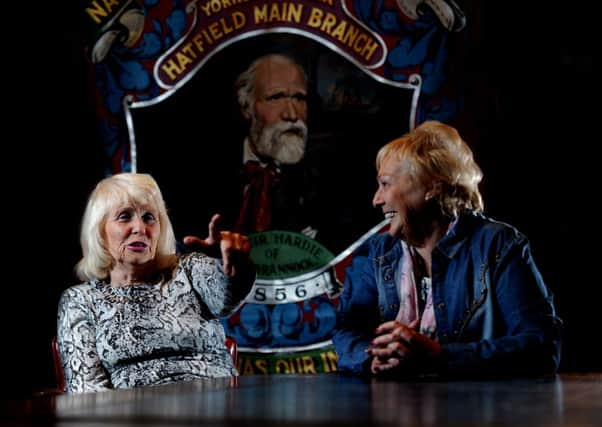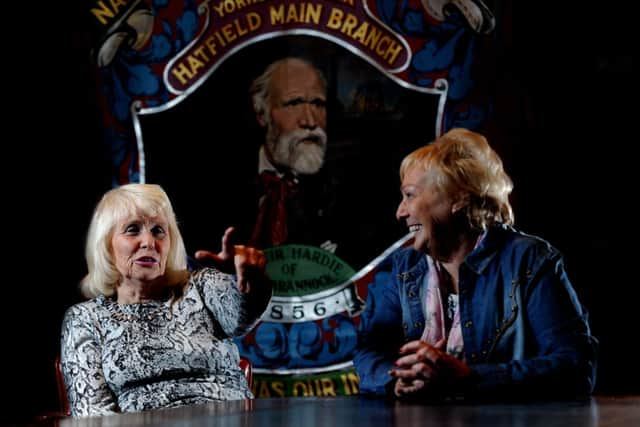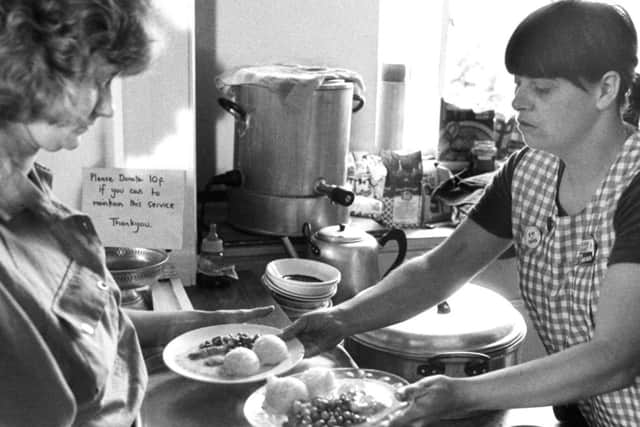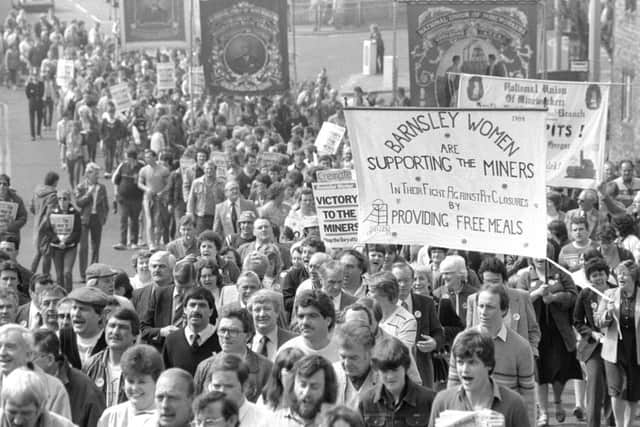How women fought to freedom in the miners strike


IN 1984 there were 180 deep coal mines in Britain. Today there are just a handful, worked by fewer than 2,000 miners. You might suppose that the fire in the belly of Women Against Pit Closures had burned itself out long ago.
Not at all. Britain hasn’t given up using coal, but nowadays it’s mostly bought in from abroad. Like the National Union of Mineworkers, WAPC members are still spreading a message: that we should be supplying our own energy needs by mining the estimated 300 years worth of coal that still lie beneath our feet.
Advertisement
Hide AdAdvertisement
Hide AdThe debate about coal goes on, say Anne Scargill and Betty Cook, but there are dozens of other causes that have benefited from seasoned campaigners like them whose political education was, in effect, the strike.


During that year, droves of women left the kitchen sink and learned about resistance and rebellion during a bitter fight to save not just jobs but whole communities. They also learned how a community can help itself – and many gained equality in their own lives.
Both now in their 70s, Anne (who for 37 years was married to NUM leader Arthur Scargill) and Betty met at a meeting of pioneering Barnsley area miners’ wives who were organising soup kitchens and food parcels to prevent the hunger experienced in previous strikes.
Anne worked at the Co-Op as and had one daughter. Betty was married with three sons and worked for a non-unionised mail order company.
Advertisement
Hide AdAdvertisement
Hide Ad“We wanted to do our bit,” says Anne. “Margaret Thatcher had just smashed the steelworkers but she didn’t know what she was taking on once we got going.”


While the soup kitchens got underway, Anne, Betty and others set up courses to advise miners’ families on how to get benefits. “Then we heard that lads were getting beaten up on the picket line, and decided to join the pickets to show solidarity. We shouted at scabs, sang our songs and the police did find us a handful. Yes, I suppose we did set out to wind them up sometimes…”
Picketing early in the morning then going to work, they also travelled up and down Britain talking to any group who invited them, to raise awareness and cash and encourage other women to organise themselves.
“Some miners were not happy when their wives were out picketing and running soup kitchens or giving talks. The strike gave many women who’d been putting up with unhappiness in their marriage the confidence to feel they would be okay if they left it behind.
Advertisement
Hide AdAdvertisement
Hide Ad“Most miners’ wives didn’t work but through the strike they found friends and a life outside the home they thought they’d never know. You could say the genie was out of the bottle.


“I wouldn’t say the stress of the strike broke up my marriage, as it did for some couples. It was more that it enabled me to leave because I’d realised I wasn’t stupid and I could survive.” She later took a degree in sociology and social policy.
At one stage Betty’s kneecap was broken during scuffles with police on the picket line at Woolley Colliery. Anne often drove a minibus of Barnsley miners’ wives down to picket lines at flashpoint collieries in North Nottinghamshire, and after one of several arrests she was put in a dog pen in the pouring rain then strip searched.
Eventually she was banned from the Nottinghamshire coalfield. “I still hate the police,” she says. Meanwhile, being married to Arthur meant daily death threats and prying eyes and ears continually.
Advertisement
Hide AdAdvertisement
Hide Ad“The whole experience made me harder and stronger,” she says cheerfully.
They fought again when the actual pit closures loomed in the early 90s, and have campaigned for other causes as disparate as asylum seekers and refugees, peace and reconciliation, equality and employment rights issues and medical aid for Cuba. They have been called on to speak all over the world.
Jean Miller was a 42-year-old single mother of three when the strike began. Her dad had been a pit deputy and on the first night of the strike she and friends discussed what they could do to help.
“Mrs Thatcher was telling the country that women and children in the coalfields did not support the strike, and we wanted to show that we did, wholeheartedly.”
Advertisement
Hide AdAdvertisement
Hide AdA press statement was sent out on behalf of miners’ wives around Barnsley, and the world’s media descended.
“They told us that we were probably starting a movement as important as the Greenham Common women. We just wanted to do whatever we could. We created an alternative welfare system,” says Jean.
“But still, as the months went on people lost their houses through non-payment of rent, and marriages and families were broken up under the strain.”
Luckily Jean had brought up her sons and daughter to be independent, and they took over the running of the house while she worked all day then went straight to speak at meetings.
Advertisement
Hide AdAdvertisement
Hide Ad“Someone confident would take someone who was frightened of speaking to a crowd to sit alongside her on the platform. That way they learned how to do it.” The process of women leaving the home and discovering their own strength meant the menfolk were left to spend more time with their children than many had previously, says Jean.
“Some men had mixed feelings about what the women were doing; some thought they shouldn’t be doing it, but at the same time they were proud of them. Women became confident and couldn’t go back to being meek and mild.”
Brenda Procter, currently national chair of Women Against Pit Closures, was an ex pottery worker and a mum at home with two small children in early 1984. She soon found herself helping to run North Staffordshire Miners’ Wives’ Action Group.
“The strike changed my life. For one thing my husband and I reversed roles and he took over at home. We organised food parcels and picketed at the six pits in the area, and were asked to speak about what we were doing all over the place. I couldn’t believe I was doing these things.
Advertisement
Hide AdAdvertisement
Hide Ad“No, we didn’t have much money, but everybody was the same, and no-one starved. At the end of the strike the women were devastated but we never felt defeated. We made a pledge that day to go on fighting the pit closures and other causes we saw as unjust.”
Brenda became a Labour councillor on Stoke City Council and studied for a degree in industrial relations at Keele University. Since the strike she and a group of other miners’ wives have gone on to support striking printers at Wapping, the Fire Brigades Union members and the Liverpool dockers’ cause.
They continue to support the Orgreave Truth and Justice Campaign, because they say no-one has been held to account for the dozens of injuries suffered by picketing miners during that infamous confrontation with police in summer 1984.
During the strike, film maker Anne-Marie Sweeney got involved in raising money for the miners’ cause. She has since then made many films which chronicle the history of women’s involvement in struggles for social and industrial justice.
Advertisement
Hide AdAdvertisement
Hide Ad“There’s a history of it going back to the end of the 19th century, when women in a factory in Oxfordshire won the right to picket,“ says Anne-Marie.
She interviewed many women involved in WAPC, and her latest film, about WAPC, also charts how miners’ wives’ groups continued their activism and inspired others. It will be premiered at a 30th anniversary celebration of the strike this Saturday in Chesterfield (see below).
“Almost unanimously the women I interviewed said ‘I’m not political’ but they had found themselves catapulted into a confrontation and some went through experiences like strip searches and court appearances. That changed them.
“The strike gave many women empowerment and freedom. A statement that echoes through all disputes and campaigns involving women is that they did what they did for their children, grandchildren and community.
Advertisement
Hide AdAdvertisement
Hide Ad“Another hallmark of this struggle and others fought by women is that they had support from trades union rank and file across the world. They were greatly admired because they’re women of great principle and backbone.”
Looking back, Anne and Betty say they’d do it all again. “We were not political to begin with. but we became political through fighting for families and community, “says Betty. “We were very upset when the men went back, and if anyone had asked us we’d have said no, let’s carry on.”
• Archive pictures by Martin Jenkinson